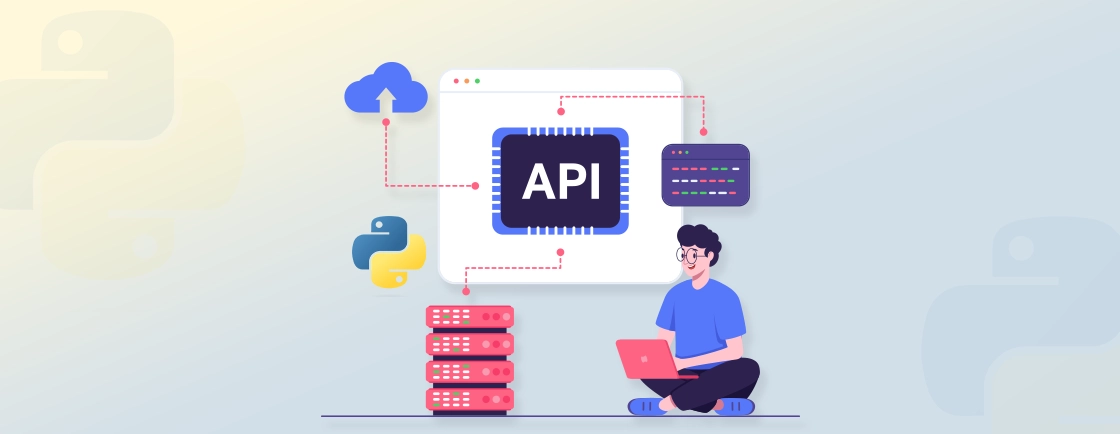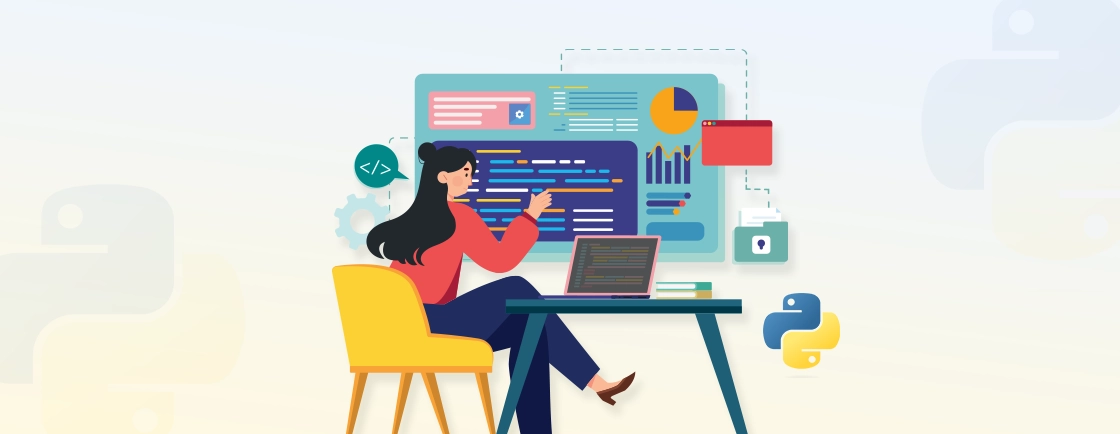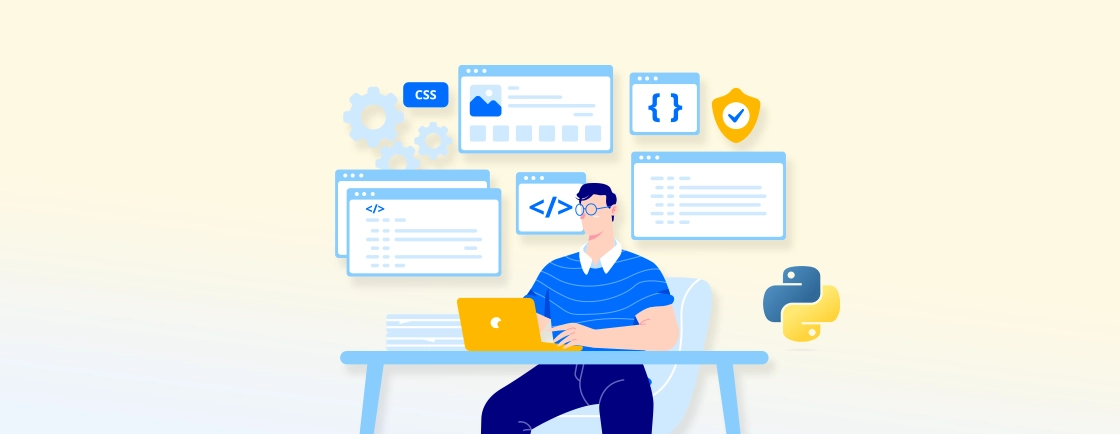Table of Contents
Python is definitely one of the most popular programming languages globally, but did you ever wonder why? If you’re just starting to learn to code or you’re an experienced developer, there’s a good chance you’ve used Python or at least heard about it.
Python’s user-friendly syntax,vast libraries, and versatility across different fields like web development, data science, and machine learning make it a top choice for many. These factors have also made python development services really popular.
In this blog, we’ll explore the reasons behind Python’s rise to this much popularity and why it continues to be a favorite among different types of developers.
What is Python?
Python is a high-level, interpreted programming language known for its readability and strong integration capabilities. Unlike some languages that can feel cryptic, Python’s syntax is designed to be clear and close to natural language. That makes it a great choice for beginners.
Its focus on readability also translates to easier maintenance for existing code, saving you time and frustration down the line.
Web development is a major area where Python shines, and one of the main reasons are the Python libraries. Plus, frameworks like Django and Flask make web development smooth and effective. Python is also used by data scientists and researchers for a wide range of applications. Now, let’s dive into its features.
Key Features of Python
Here are some of the key features of Python that make it a popular programming language:
- Dynamically Typed: Python is dynamically typed, meaning you don’t need to specify data types. This allows for more flexibility but can lead to runtime errors if data types are not handled carefully.
- Interpreted Language: It is an interpreted language, which means your code is executed line by line at runtime. That makes it easier to test and debug your code, as you can see the results of your code immediately after you write it.
- High-level Language: Python is a high-level language, meaning it is closer to human language than machine language. It makes Python code more readable and easily maintainable.
- Object-oriented: It supports object-oriented programming (OOP), allowing you to create objects representing real-world entities. OOP can make your code more modular and reusable.
- Extensive Standard Library: Python comes with a large standard library that includes a variety of modules and functions for common tasks. This can save you time and effort, as you don’t have to write your code from scratch.
- Large Third-Party Libraries: Besides the standard library, a vast ecosystem of third-party libraries is available for Python. These libraries can provide you with functionality for various tasks, such as web development, data science, and scientific computing.
- Portable: Python code can be run on various platforms, including Windows, macOS, Linux, and more. That makes it a versatile language suitable for a wide range of projects.
- Automatic Garbage Collection: Python uses automatic garbage collection, so you don’t have to manually manage memory allocation and deallocation. This can help to prevent memory leaks and make your code more efficient.
- Free and Open-Source: Python is an open-source language that is freely available for anyone to use and modify. This makes it a cost-effective option for businesses and individuals.
In summary, Python’s dynamic typing, interpreted nature, and high-level syntax make it flexible, readable, and easy to debug. If you want to get scalable, efficient, and secure applications built using Python to meet your unique needs, you can opt for professional Python developement services.
Why Is Python So Popular?
Python’s popularity isn’t just about its features; it also benefits programmers of all levels. Here are a few reasons why Python is so popular:
Versatility
Python’s strength lies in its ability to excel in various domains. It’s not just for web development or data science, although it shines in those areas. Python can be used for scripting, automation, scientific computing, and machine learning.
This versatility makes it a valuable asset for programmers who want a language that can adapt to different projects and interests. It is commonly used for web development and for building robust websites. In data science and machine learning, libraries like pandas make it easy to work with data and build machine learning models.
Readability and Simplicity
Python code resembles natural language, with clear indentation defining code blocks. This makes it easier for programmers to understand the logic behind the code, saving them development time.
Its syntax uses plain keywords, such as “if,” “else,” and “while,” which are intuitive and easy to understand. Clear code allows developers to make changes with minimal effort as projects evolve.
Large Standard Library
Python comes with a standard library that supports many common programming tasks. This library includes modules for working with files, databases, networking, data processing, and more. By leveraging the standard library, developers can write code more efficiently and focus on solving problems rather than starting from scratch.
The best Python libraries like NumPy, Pandas, and PyTorch empower developers to achieve better results without reinventing the wheel.
Scalability and Performance
Python’s flexibility allows developers to build scalable applications. For performance-critical applications, Python can integrate with other languages like C/C++ to boost performance. Tools like Cython compiles Python code into C, enhancing execution speed.
PyPy, an alternative implementation of Python, uses Just-In-Time (JIT) compilation to speed up execution. Despite its interpreted nature, Python’s design allows it to handle large-scale systems effectively.
Security
Python provides several built-in features and libraries to help developers write secure code and applications. For instance, the Python secrets module offers functions for generating strong passwords, account authentication, and security tokens.
Frameworks like Django and Flask have built-in security features to protect against common web application vulnerabilities. It includes security against SQL injection, cross-site scripting (XSS), and cross-site request forgery (CSRF).
Community and Ecosystem
Python has a large and active community of developers contributing to its growth and development. This community provides support through forums, tutorials, and documentation, making it easier for developers to learn and use Python.
Additionally, Python has a rich ecosystem of third-party libraries and frameworks that simplify complex tasks. This ecosystem includes libraries for web development, data science, machine learning, and more. That makes Python an all-in-one development language.
The versatility and simplicity put Python on top of development language charts. So if you want to make the best of this language and its benefits, consult with professional Python developers. But obviously, there are other languages, and that’s what we’ll explore next.
What are the Alternatives of Python?
Python is a versatile and widely used programming language, but some alternatives offer robust solutions for various requirements. Here are some notable alternatives to Python:
JavaScript
JavaScript is the go-to language for web development, enabling dynamic and interactive front-end applications. With Node.js frameworks, it extends to server-side development, making it a versatile choice for full-stack development. Plus it boasts a rich ecosystem of web frameworks like React and Angular and community support. That makes it one of the best web development languages.
Java
Java is a robust, object-oriented language widely used for building large-scale enterprise applications and backend systems. Its platform independence via the Java Virtual Machine (JVM) ensures code portability across environments. Known for its performance, scalability, and strong typing, Java remains a staple in enterprise-level and mobile development.
C++
C++ is a high-performance, compiled language ideal for system/software development and real-time simulations. It offers fine control over system resources and low-level memory manipulation. Its efficiency and speed make it suitable for performance-critical applications. Plus, its extensive standard library supports complex software engineering tasks.
Ruby
Ruby is another excellent option for beginners, sharing Python’s focus on readability and clear syntax. It’s particularly popular for web development with frameworks like Ruby on Rails and is known for its rapid development capabilities. However, Ruby’s community and ecosystem might not be as vast as Python’s in some domains.
Go(Golang)
Go, designed by Google, is a statically typed, compiled language known for its simplicity and efficiency. It excels in system programming, cloud services, and microservices architecture. Go’s robust standard library and efficient execution make it ideal for modern scalable and high-performance applications.
These alternatives do not exactly provide what Python can offer, but they may have something that Python doesn’t have. After defining your requirements, looking at this option may lead to a better solution for your project.
Conclusion
Python’s status as the top programming language is well-earned due to its unique combination of simplicity, versatility, and power. It’s clear syntax and ease of learning make it a favorite among beginners. On the other hand, its extensive libraries and robust community support provide powerful tools for diverse applications.
Python excels in web development, data science, and automation, showcasing its language flexibility. Its rapid development capabilities and scalability ensure it can handle projects of any size, from small scripts to large-scale systems.
So, if you want to use Python’s capabilities for your website for the best performance, hire Python developers from us today!
FAQs on Why is Python Considered the Top Language
Is Python suitable for large-scale applications?
Yes, Python is suitable for large-scale applications. Its scalability is demonstrated by its use in major companies like Google, Instagram, and Netflix. Python’s robust frameworks and ability to integrate with other technologies allow it to handle large-scale systems effectively.
What makes Python a preferred choice for data science and machine learning?
Python’s libraries, like pandas and PyTorch, provide data manipulation, analysis, and machine learning tools. Its simplicity and readability enable quick prototyping and experimentation. This makes it an ideal choice for data scientists and machine learning engineers.
Can Python be used for web development?
Absolutely. Python is widely used for web development. Frameworks like Django and Flask make it easy to build robust and scalable web applications. They offer tools for handling databases, user authentication, and other common web functionalities.
Python Solutions for Your Projects
Explore tutorials and resources to master Python for various applications.





